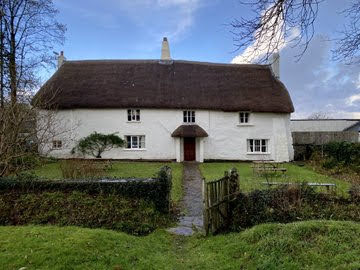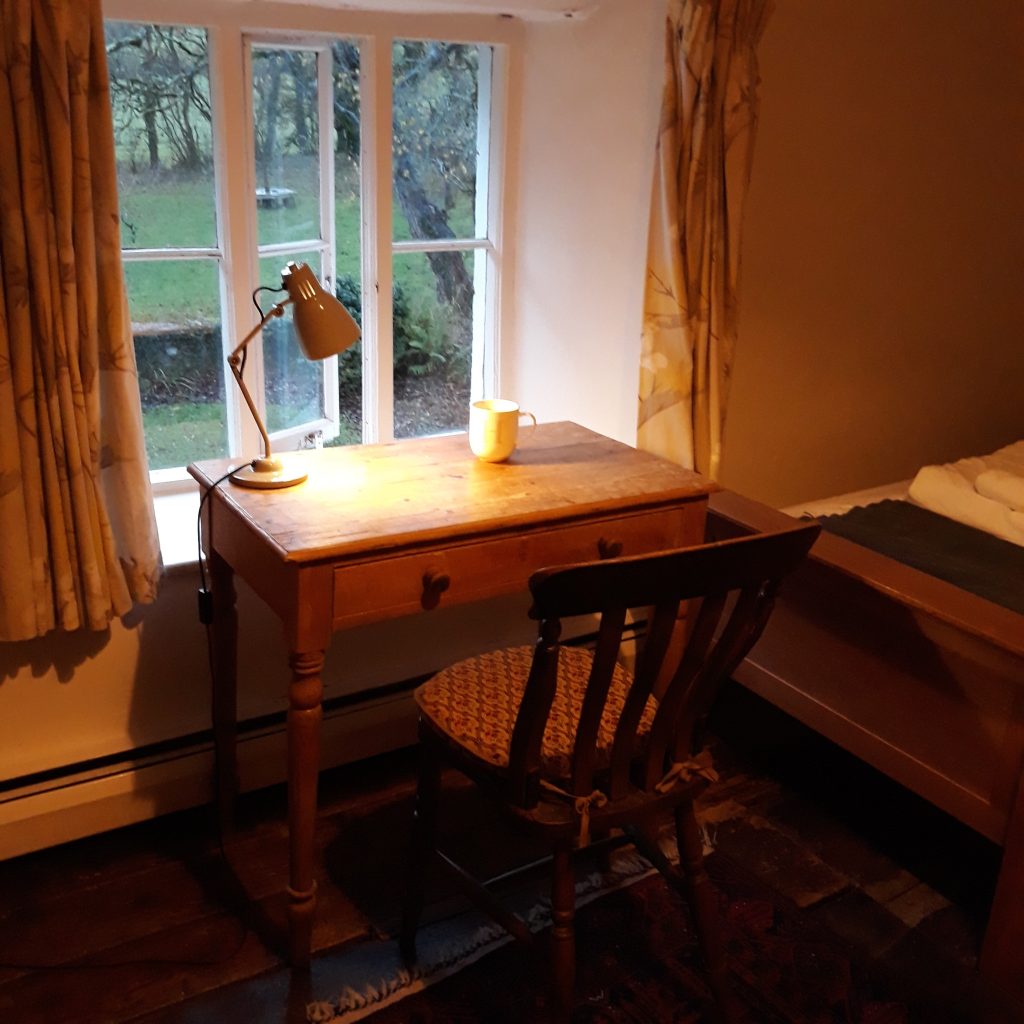
A writing week with the Arvon Foundation
Have you ever wondered what it’s like to spend a week away writing? I am an enormous fan of spending creative time away with others on an organised writing holiday. So, I am really pleased to be sharing this fabulous guest post by writer, Hilary Smith. Hilary, who is co-author of a non-fiction book for primary school teachers published by Routledge, wanted to refresh her creative writing skills, so she attended a residential writing week hosted by the Arvon Foundation. In this post she shares her story and describes how the experience inspired her to keep writing. Over to Hilary:
My writing week at Totleigh Barton
It is early December and the light is fading as I drive down the steep, muddy track looking for signs of habitation. Before leaving home I’d checked my route more than once but now there’s no longer a signal on my phone and I’m seriously doubting whether I’ll ever find my destination in this remote wintry landscape. Then, a large thatched manor house comes into view and I feel instantly relieved, convinced that the image before me promises to be a safe and welcoming haven for the next five days.

So begins my experience of an Arvon Foundation residential week exploring short story writing. I’ve come here to discover whether my neglected creative writing skills can be reignited by staying in an isolated sixteenth century house, with two successful authors and a dozen other aspiring writers.
Excitement and encouragement
During my professional life I’ve had a few academic articles published and recently co-authored a book for teachers but I haven’t written any fiction since leaving school over four decades ago. I approach the course with some trepidation and small ambitions. If I produce anything worthy of reading aloud by the end of the week (which we are invited to do on the course outline) I will feel very proud of myself.
As soon as I get out of my car I’m greeted by a member of Arvon’s staff team who smiles warmly and welcomes me inside. She leads me through a bustling farmhouse kitchen into a large dining room with a wood burning stove, beamed ceiling and a huge oak table where all the communal meals are shared. As we pass into the hallway and up the wide staircase I notice pieces of antique furniture and artwork everywhere and of course, shelves and shelves of books.
“Your room is by the poetry library,” she says.
I feel privileged and humbled to be surrounded by such luminaries, hoping that some of their talent will rub off on me.
My room
My room is large and airy with a sloping ceiling, bare creaky floorboards and thick walls that reflect the age of the house. The furnishings are basic, a rickety wardrobe, an ancient chest of drawers and an old sink with pipes that knock when the taps are turned. But the bed is soft and inviting and the low, deeply recessed window looks out over the garden, woods, and empty fields beyond. A desk is placed in front of the window, like a cliché, inspiring great writing to happen. I’m both enchanted and intimidated.

I unpack and venture downstairs to meet the rest of the group. We share pleasantries over tea and cake, finding the connections between us. We range in age between 30 and 70, and come from a mixture of backgrounds and professions although, as I expected, there are more women than men (about two thirds to one third).
Two of the Arvon team give us an introduction to the house rules (thankfully few) and encourage us to make full use of the beautiful surroundings during our stay, advising us on walking routes but also about the unfriendly local cattle! Despite this warning, we continue to relax over our first dinner together and as the wine flows, the chatter and the laughter increase.
After dinner we have our first tutored session. We play a few icebreakers, hear about the programme for the week ahead and reveal a little more of ourselves as we share our writing hopes and ambitions. When the official session is over, we carry on chatting and finding connections, some of us late into the night. I go to bed buzzing, excited about what is to come.
How the day pans out
The writing workshops are after breakfast each day. We bring our cups of tea and coffee to the converted barn across the yard from the house and settle into the sofas and armchairs. Our tutors for the week are Chris Power and Vanessa Gebbie (look them up, their writing is formidable) who skilfully lead us into the craft of short story writing, through readings, discussions, exercises and examples. We read aloud from the likes of Chekhov, Ali Smith, Peter Orner, Stuart Dybek, and more. We tease out what brings characters alive, what compels us to read on, what helps us imagine a place, what suspends us in time.
I discover how to play word cricket, the art of ‘show don’t tell’, that concrete descriptions are more effective than abstract ones, how to use dialogue sparingly, that some writers are planners and some are pantsers (they write by the seat of their pants), that there are no rules to short story writing (and yet there are) and oh yes, how to write lists. Each morning in that barn we explore, we challenge, we share experiences, we learn from each other, we are inspired to write!
Food, warmth and companionship
The afternoons are free for individual writing and one to one tutorials, and each evening we feast on a home-cooked dinner made by members of the group. Communal cooking is a feature of Arvon writing weeks, and everyone is on a rota to prepare and serve one evening meal. I’m not a confident cook but my anxieties quickly disappear when I discover that clear instructions and recipe cards as well as all the ingredients needed, are laid out ready on the kitchen table for that evening’s cooks to use. The food we make is delicious and the whole experience strengthens my feelings of warmth and companionship.
In the evenings we gather again in the barn for more reading aloud and sharing our love of stories. Chris and Vanessa read from some of their published work, we hear from the writing of a guest author and at the end of the week we read out our own.
Time for a guest
After two days on the course I still haven’t made a start on my short story although I have written plenty in my journal about the view from my window and copious notes from the morning workshops. On Wednesday evening the guest author arrives, a diminutive but larger than life woman, with luxurious black hair, worthy of a L’Oréal shampoo advert, wearing a black polo neck jumper, black leather trousers and a huge smile.
Exuding charm and cheeky humour, Ingrid Persaud regales us with tales of Trinidad spattered with funny anecdotes in “Trinnie” dialect with much hair flicking and teeth-sucking, and describes her journey from barely-known blogger to internationally acclaimed author. We are enthralled. Amongst her generous responses to our questions, I retain this advice: work hard, then harder, until it hurts; write everyday and don’t make excuses; and, memorably, write sex scenes that embarrass you.
Inspired by Ingrid’s passion, good humour, and work ethic, I finally begin writing my short story and by the following afternoon I have a couple of paragraphs to share with Chris in my first one-to-one tutorial.
The pod in the garden
On a tutored Arvon course you are allocated two tutorial times during the week and at Totleigh Barton these take place in a bespoke glamping ‘pod’ in the garden, all Scandinavian wood and mood lighting: an intimate, secluded space that encourages a feeling of safety and trust. I certainly feel safe enough to share my lack of confidence as a writer as well as expose my budding story to its first audience of one, (keenly aware of that one being a successfully published author). I enter the pod feeling anxious and fraudulent, I leave feeling excited, and so energised I return to my room and write non-stop for four hours, barely lifting my head until the dinner bell shakes me out of my trance.

How to get Sheila back to the kitchen
My second tutorial is with Vanessa on the last day of the course. Although by this time I have fleshed out more of my story, it is still incomplete and I’ve started to lose my nerve, angsting over every word and over thinking each sentence. Vanessa’s no-nonsense approach puts me straight:
“I don’t know how to get Sheila (my main character) back into the kitchen, maybe I shouldn’t send her upstairs in the first place? But her going upstairs is necessary for the plot so the children are left alone downstairs and it sets the scene for…”
“how about writing ‘Sheila came back into the kitchen’?”
The simplicity of this leaves me open-mouthed with relief and gratitude.
I am a writer
On the final evening we gather in the barn as usual, wine glasses in hand, feeling nervous. We each take turns to read our stories aloud. Not all are complete, most are early drafts but every single one is extraordinary. A fortune-teller dying in her booth on the pier, sisters queuing with eggs and bricks, a fastidious man adoring a footstool, an exquisite gold crest, an outrageously funny giant, and more besides, all come alive and join us in the room. We are absorbed, attentive, we feel moved, we applaud each other.
And when it is my turn to read my own piece aloud, I experience the loving attention of the group. I feel recognised, known and I feel proud. I belong to a group of writers; I am a writer.
Then and now
As the time between my retreat at Totleigh Barton and today expands, I am still absorbing and exploring what was said, what I felt, what I learned and how I learned it. The words and wisdom still resonate. My confidence and self-belief as a writer was boosted immeasurably by being there. I now write nearly every day and have started submitting pieces to competitions. And the evidence is here, in this piece of writing. Not a fictional short story but a story nonetheless and one, I believe, worth sharing and passing on.
The Arvon Foundation
Arvon Foundation offers a wide range of writing courses, workshops, tutored courses and writing retreats as well as Arvon Online. For further information go to: https://www.arvon.org
About Hilary
Hilary Smith is a retired teacher and lecturer living in Bristol. She has extensive experience in primary and early years teaching and is a freelance education consultant and trainer. She is a passionate advocate for schools where relationships are central to learning and believes that all children deserve teachers that are warm-hearted, kind and compassionate.
She recently co-authored a book for teachers: Relationship-Based Pedagogy in Primary Schools: Learning with Love published by Routledge. Her aspirations as a fiction writer, especially short story writing, continue to grow and although she has not yet won a competition or had a story published, she is still working at it!